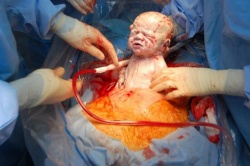Difference between revisions of "Caesarean section"
(Created page with "thumb|250px| Caesarean section is the surgical delivery of a baby through the abdomen rather than the birth canal. This procedure can become necessary ...") |
|||
| Line 1: | Line 1: | ||
[[File:12e886.jpg|thumb|250px|]] | [[File:12e886.jpg|thumb|250px|]] | ||
| − | Caesarean section is the surgical delivery of a baby through the abdomen rather than the birth canal. This procedure can become necessary because of the mother’s narrow pelvis, the position of the child or an unusually large child. Until the introduction of antiseptic surgery in the 19th century, 75% of women undergoing caesarean sections died. Later legends surround Prince Siddhattha’s conception and birth with numerous fantastic miracles (M.III,119-123). One of these is that he was born through his mother’s right side, although this is not mentioned anywhere in the Tipiṭaka.Interestingly, this may be one legend that had its origin in fact. Although only available to the rich and powerful, caesarean section was known in ancient India. If Siddhattha’s was indeed a caesarean birth this might also explain why his mother, Mahā Māyā,died seven days after delivery (M.III,122). | + | |
| + | |||
| + | |||
| + | [[Caesarean section]] is the surgical delivery of a baby through the {{Wiki|abdomen}} rather than the [[birth]] canal. This procedure can become necessary because of the mother’s narrow pelvis, the position of the child or an unusually large child. | ||
| + | |||
| + | Until the introduction of antiseptic surgery in the 19th century, 75% of women undergoing [[caesarean sections]] [[died]]. Later {{Wiki|legends}} surround {{Wiki|Prince}} [[Siddhattha’s]] {{Wiki|conception}} and [[birth]] with numerous fantastic [[miracles]] (M.III,119-123). | ||
| + | |||
| + | One of these is that he was born through his mother’s right side, although this is not mentioned anywhere in the [[Tipiṭaka]]. | ||
| + | |||
| + | Interestingly, this may be one legend that had its origin in fact. Although only available to the rich and powerful, [[caesarean section]] was known in {{Wiki|ancient India}}. | ||
| + | |||
| + | If [[Siddhattha’s]] was indeed a caesarean [[birth]] this might also explain why his mother, [[Mahā]] Māyā,died seven days after delivery (M.III,122). | ||
{{R}} | {{R}} | ||
[http://www.buddhisma2z.com/content.php?id=65 www.buddhisma2z.com] | [http://www.buddhisma2z.com/content.php?id=65 www.buddhisma2z.com] | ||
[[Category:Buddhist Terms]] | [[Category:Buddhist Terms]] | ||
Latest revision as of 00:59, 5 January 2016
Caesarean section is the surgical delivery of a baby through the abdomen rather than the birth canal. This procedure can become necessary because of the mother’s narrow pelvis, the position of the child or an unusually large child.
Until the introduction of antiseptic surgery in the 19th century, 75% of women undergoing caesarean sections died. Later legends surround Prince Siddhattha’s conception and birth with numerous fantastic miracles (M.III,119-123).
One of these is that he was born through his mother’s right side, although this is not mentioned anywhere in the Tipiṭaka.
Interestingly, this may be one legend that had its origin in fact. Although only available to the rich and powerful, caesarean section was known in ancient India.
If Siddhattha’s was indeed a caesarean birth this might also explain why his mother, Mahā Māyā,died seven days after delivery (M.III,122).
